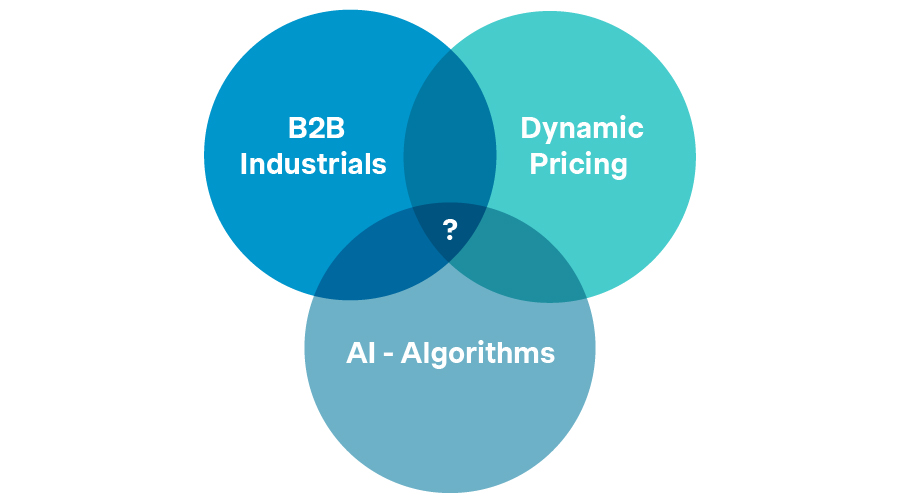Dynamic pricing - adjusting prices in real-time based on factors like market demand and supply conditions - has long been a staple in consumer-facing industries. However, B2B industrials companies have largely remained skeptical.
That said, in certain spaces of the B2B industrials universe, dynamic pricing has proven relevant. Examples can be found at wholesalers selling product categories that are mainly dominated by ecommerce (e.g., power tools), in logistics services, or in base materials and commodity chemicals where formula pricing mechanisms are used.
Meanwhile, Artificial Intelligence (AI) seems to be on top of everyone’s minds and B2B Industrials companies are no exception. The media is full of example use cases on AI. These can range from demand forecasting, segmenting customers, deeper customer insights, automation along the lead-to-cash and customer care processes, reduced margin leakage, predictive maintenance, and many others.
"AI's integration into the industrial sector will be profoundly disruptive, leading to new business models, enhanced operational efficiencies, and the redefinition of the workforce. The impact will be far-reaching, necessitating strategic adaptation."
– World Economic Forum, The Future of Jobs Report 2020

The interplay between AI and dynamic pricing in B2B industrials companies
- Will AI enable dynamic pricing for a much larger base of B2B industrials companies?
- Will AI elevate B2B companies that can apply dynamic pricing to a higher level?
- Or do AI and dynamic pricing just not fit together for B2B industrials companies?
The short answer: AI and dynamic pricing can work together. This has been proven in countless B2C markets from online retail, to taxis, to hotels, to airlines. But what is different for B2B industrials?
Unlike in B2C, where customers largely accept automated price fluctuations, B2B industrials companies take a different view. Sales teams need to be able to explain and justify price moves to customers, typically a well-informed professional buying group.
However, this doesn’t mean that neither AI nor dynamic pricing can be applied in B2B industrials settings. Both have their distinct use.
AI and dynamic pricing in B2B: Where do they fit?
AI use cases
The most prominent use case of AI algorithms in B2B industrials is predictive maintenance, where machine learning algorithms analyze datasets from industrial machinery to predict failures before they occur. More and more B2B industrials companies are exploring the opportunities of using AI to boost process efficiency in lead-to-cash and customer care processes.
Dynamic pricing use cases
When prices adjust in real-time based on market demand and supply conditions, this strategy allows companies to respond swiftly to market fluctuations, ensuring competitive pricing while maximizing revenue. In sectors like chemicals and raw materials, where prices are highly volatile, dynamic pricing provides a strategic advantage.
However, this approach can also lead to price instability. If prices fluctuate too frequently or unpredictably, the company can erode customer trust. These caveats have led many B2B industrials companies to be very cautious when it comes to dynamic pricing.
AI and Dynamic Pricing: Combined use cases
To assess the applicability of AI-driven dynamic pricing in a B2B industrials environment, we have to deep dive into specific market segments. As mentioned, for many B2B industrials companies dynamic pricing is not suitable, and pricing is only one field in the huge spectrum of relevant AI applications.
That said, in specific environments, AI-powered dynamic pricing has delivered measurable benefits. For example, an industrial manufacturer has used AI to forecast commodity price fluctuations, allowing them to optimize pricing strategies while maintaining market competitiveness. Similarly, a logistics provider has implemented AI-driven demand forecasting to adjust pricing based on real-time capacity constraints, improving both revenue optimization and efficiency.
How to succeed with AI-driven dynamic pricing
Despite these examples, the broader adoption of AI-driven dynamic pricing in B2B remains limited due to several specific conditions and key challenges. For B2B industrial companies to truly benefit from the pairing of dynamic pricing and AI, certain conditions must be met:
High market volatility:
Companies operating in highly volatile markets can significantly benefit from dynamic pricing. Here, AI helps to forecast demand and supply and adjust spot pricing proactively using dynamic pricing.
Data quality and availability:
High-quality, comprehensive, and clean data is crucial for AI and dynamic pricing systems. Many B2B industrial companies struggle with fragmented data sources, inconsistent data formats, and incomplete datasets, which can impede the accuracy. Investing in robust data management and systems is essential but costly. Many companies may have legacy systems that are not compatible with these advanced technologies.
Change management and skills gap:
Integrating AI and dynamic pricing into business operations involves significant changes in workflows and processes. Particularly in customer facing units, resistance to dynamic pricing and AI can be high, as sales teams need to be able to justify price changes to customers. The complexity of AI models often means methods and results are not self-explanatory and are difficult to understand.
Beyond that, AI and dynamic pricing require a skill set that is often not available in most B2B industrials companies. Sourcing the right talent and investing in training programs to upskill employees is critical.
Price fluctuations:
Many B2B companies rely on stable pricing structures to maintain strong relationships with their distribution networks and customers. Frequent price changes can create uncertainty and distrust among partners who expect consistent pricing. Too frequent price changes may encourage customers to pass on cost changes to their customers and harm their profitability, leading to potential conflicts and loss of business.
Giving up control over pricing decisions:
Another critical consideration is the degree of control companies are willing to relinquish to AI algorithms. B2B companies often prefer to stay in the driver’s seat regarding pricing decisions.
The idea of an AI "blackbox" making automatic price changes can be uncomfortable for many. It reduces transparency and understanding of the decision-making process, which salespeople need to be able to justify to customers. Ensuring that AI systems are explainable, and that human oversight remains an integral part of the pricing strategy can help mitigate these concerns.
Only companies that can cope with these specific conditions or operate in a market environment favoring these can truly benefit from dynamic pricing in a non-consumer-facing industry. For others, the key challenges and limitations mentioned make the practical implementation of dynamic pricing demanding, with far greater hurdles than in consumer-facing industries.
The key takeaway is that AI powered dynamic pricing doesn’t add new use cases enabling dynamic pricing for a broader audience in B2B industrials. But it can be a gamechanger to boost profitability and efficiency in the rather narrow scope of B2B Industrials applications where using dynamic pricing makes sense.
Alternative AI applications for B2B Industrial companies
For the broader B2B industrials environment, AI's capabilities extend far beyond dynamic pricing strategies. For B2B industrial companies where transactions often involve high volumes and complex contracts, AI can streamline various processes, improve accuracy, and enhance overall efficiency. In our project work we experience many companies successfully implementing AI-algorithms to boost lead-to-cash process efficiency. Typical use cases of AI to strengthen commercial excellence in B2B industrials firms include:
1. Demand forecasting
AI can analyze historical sales data, market trends, and macroeconomic indicators to predict future demand with high accuracy. This capability allows companies to plan their production and inventory management more effectively, balancing supply and demand without frequent price changes.
2. Customer segmentation
B2B transactions involve diverse customer bases with varying needs and price sensitivities. AI can segment customers based on purchasing behavior, preferences, and other attributes. This enables companies to tailor marketing and sales strategies to different segments without the necessity of adjusting prices frequently.
3. Inventory management
AI can optimize inventory levels by predicting demand and identifying patterns in sales data. This reduces the need for dynamic pricing to move inventory quickly, instead ensuring that stock levels align with anticipated demand.
4. Operational efficiency
AI can automate routine tasks such as order processing, customer inquiries, and data entry. This frees up human resources to focus on more strategic activities, improving overall operational efficiency without altering pricing strategies.
These examples demonstrate the potential of non-dynamic-pricing applications of machine learning. Companies should evaluate their unique situation and constraints before adopting AI-driven dynamic pricing strategies.
How Simon-Kucher can help
AI-driven dynamic pricing offers transformative potential for B2B industrial companies, enabling swift responses to market changes, optimized pricing strategies, and enhanced profitability. However, this applies only to selected use cases and segments. On a broad scale, the challenges in the B2B industrial sector are far greater than in consumer-facing industries.
We propose looking beyond dynamic pricing when searching for ways to drive commercial excellence by use of AI in B2B industrials. By focusing on AI's broader capabilities to enhance processes and increase efficiency, B2B companies can realize significant benefits while maintaining the stability and control required in their complex business environments.
Unlock the full potential of AI for your B2B industrial business with Simon-Kucher. Our experts are here to guide you beyond dynamic pricing, leveraging AI to enhance processes, increase efficiency, and drive commercial excellence. Don’t let challenges hold you back—reach out to Simon-Kucher’s industrial experts today and discover how AI can transform your business for the better.
Contact us now to start your journey toward greater profitability.
Explore all the insights from our B2B Masterclass
Unlock practical strategies in B2B pricing, sales, and marketing



